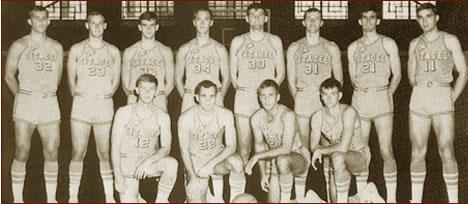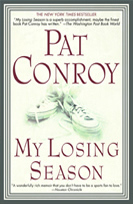

…I have loved nothing on this earth as I did the sport of basketball. I loved to break up a full-court press as much as anyone who has ever lived and played the game, black or white, male or female, in the shades of Spanish moss, beneath the roiled heat and sunshine of Dixie. I would not sell my soul to be playing college ball somewhere in this country tonight, but I would give it long and serious consideration. It was only when I had to give up basketball that I began to attract the unfavorable attention of the rest of the world. Basketball provided a legitimate physical outlet for all the violence and rage and sadness I later brought to the writing table. The game kept me from facing the ruined boy who played basketball instead of killing his father. It was also the main language that allowed father and son to talk to each other. If not for sports, I do not think my father ever would have talked to me.
— From the memoir
Description
In 1954, in Orlando, Florida, nine-year-old Pat Conroy discovered the game of basketball. Orlando was another new hometown for a military kid who had spent his life transferring from one home to another. He was yet again among strangers, still looking for his first Florida friends, but when the “new kid” got his hands on the ball, the course of his life changed dramatically. From that moment until he was twenty-one, the future author defined himself through the game of basketball.
In MY LOSING SEASON, Conroy takes the reader through his last year playing basketball, as point guard and captain of the Citadel Bulldogs. Flashing back constantly to the drama of his coming of age, he presents all the conflict and love that have been at the core of his novels. Conroy vividly recreates his senior year at that now-famous military college in Charleston, South Carolina, but he also tells the story of his heartbreaking childhood and of the wonderful series of events that conspired to rescue his spirit.
In the 1966-67 season, the Citadel basketball team enjoyed a few victories and suffered a string of defeats, but their true triumphs came when the team pulled together and played the kind of joyous basketball that exceeded the sum of the players’ individual talents. And their true humiliations came at the hands of their disciplinarian coach, who counted on the fear and cowering obedience he inspired in his young players to carry the day on the court. In young Conroy, the coach’s intimidations also inspired an odd, crouching form of love that echoed his relationship with his own fearsome father.
Without the safeguard of fiction, America’s ultimate storyteller turns to the story of his own boyhood. With poignancy and humor Conroy reveals the inspirations behind his unforgettable characters, pinpoints the emotions that shaped his own character as a young boy, and ultimately recaptures his passage from athlete to writer.
Praise
“My Losing Season is a superb accomplishment, maybe the finest book Pat Conroy has written.”
The Washington Post Book World
“A wonderfully rich memoir that you don’t have to be a sports fan to love.”
Houston Chronicle
“A memoir with all the Conroy trademarks…here’s ample proof that losers always tell the best stories.”
Newsweek
“Conroy’s prose is sweepingly lyrical…taking on emotionally laden issues in chapters so direct and powerful that readers will be moved by his intimacy with the material, and perhaps astonished by his authority over it.”
Publishers Weekly
“In My Losing Season, Conroy opens his arms wide to embrace his difficult past and almost everyone in it.”
Daily News, New York
“Haunting, bittersweet, and as compelling as his bestselling fiction, My Losing Season succeeds because Conroy fuses his basketball story with a remarkable portrait of tireless teammates, a fractured family, a nation in transition and a young boy learning the hard way that sometimes losing can be just as rewarding, if not more so, than victory.”
Boston Herald
“Moving…will lunge for nostalgic readers’ hearts.”
Entertainment Weekly
“As heartfelt and poignant a memoir as they come and a splendid contribution to the literature of sport.”
Los Angeles Times Book Review
“Conroy revisits his past with naked candor.”
Houston Chronicle, Fall Books Preview
“A coming-of-age theme can hardly go wrong when spun by a real wordsmith. This won’t disappoint.”
Daily News of Los Angeles
“Thrilling and heartbreaking.”
Richmond Times-Dispatch
“A sports memoir written with the darker music.”
The Miami Herald
“The triumph of his losing season!”
Sun-Sentinel, Fort Lauderdale